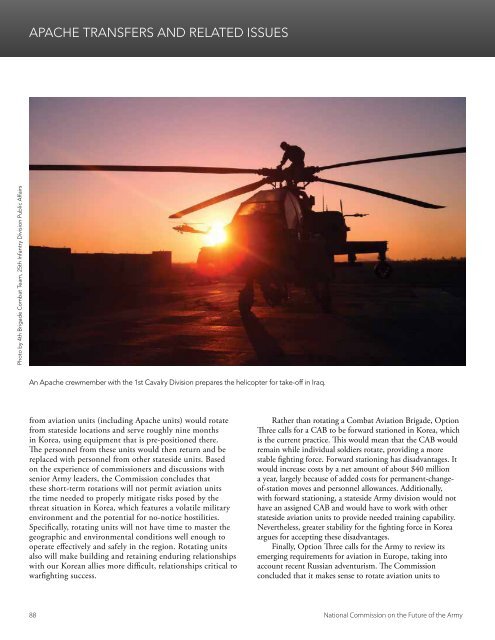THE FUTURE OF THE ARMY
Futurearmy
Futurearmy
Create successful ePaper yourself
Turn your PDF publications into a flip-book with our unique Google optimized e-Paper software.
APACHE TRANSFERS AND RELATED ISSUES<br />
Photo by 4th Brigade Combat Team, 25th Infantry Division Public Affairs<br />
An Apache crewmember with the 1st Cavalry Division prepares the helicopter for take-off in Iraq.<br />
from aviation units (including Apache units) would rotate<br />
from stateside locations and serve roughly nine months<br />
in Korea, using equipment that is pre-positioned there.<br />
The personnel from these units would then return and be<br />
replaced with personnel from other stateside units. Based<br />
on the experience of commissioners and discussions with<br />
senior Army leaders, the Commission concludes that<br />
these short-term rotations will not permit aviation units<br />
the time needed to properly mitigate risks posed by the<br />
threat situation in Korea, which features a volatile military<br />
environment and the potential for no-notice hostilities.<br />
Specifically, rotating units will not have time to master the<br />
geographic and environmental conditions well enough to<br />
operate effectively and safely in the region. Rotating units<br />
also will make building and retaining enduring relationships<br />
with our Korean allies more difficult, relationships critical to<br />
warfighting success.<br />
Rather than rotating a Combat Aviation Brigade, Option<br />
Three calls for a CAB to be forward stationed in Korea, which<br />
is the current practice. This would mean that the CAB would<br />
remain while individual soldiers rotate, providing a more<br />
stable fighting force. Forward stationing has disadvantages. It<br />
would increase costs by a net amount of about $40 million<br />
a year, largely because of added costs for permanent-changeof-station<br />
moves and personnel allowances. Additionally,<br />
with forward stationing, a stateside Army division would not<br />
have an assigned CAB and would have to work with other<br />
stateside aviation units to provide needed training capability.<br />
Nevertheless, greater stability for the fighting force in Korea<br />
argues for accepting these disadvantages.<br />
Finally, Option Three calls for the Army to review its<br />
emerging requirements for aviation in Europe, taking into<br />
account recent Russian adventurism. The Commission<br />
concluded that it makes sense to rotate aviation units to<br />
88 National Commission on the Future of the Army


